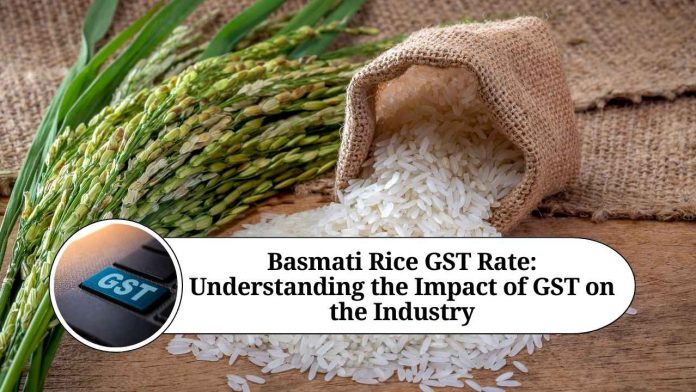Basmati Rice GST Rate: Understanding the Tax Structure
Basmati rice is a premium quality rice variety that is popular worldwide for its aroma, flavour, and texture. In India, it is widely consumed and exported to various countries. As with any other commodity, basmati rice is subject to various taxes and levies, including the Goods and Services Tax (GST). In this blog, we will discuss the GST rate on basmati rice and the various aspects related to it.
Understanding GST
GST is a comprehensive indirect tax that was implemented in India on 1st July 2017. It replaced various indirect taxes levied by the central and state governments, such as excise duty, service tax, value-added tax (VAT), etc. GST is a destination-based tax that is levied on the value addition at each stage of the supply chain.
GST on Basmati Rice
Basmati rice attracts GST at the rate of 5%. This is the lowest GST rate applicable to any rice variety in India. The 5% GST rate is applicable to both the raw and parboiled (sella) basmati rice. This rate is applicable to both packaged and loose basmati rice.
Exemptions and Conditions
However, there are certain exemptions and conditions related to the GST rate on basmati rice. Let’s discuss them below:
- Basmati rice sold in unbranded form is exempted from GST. This means that if the basmati rice is sold without a brand name, it is not subject to GST.
- If basmati rice is sold in packaged form, the package should bear the name, address, and GSTIN of the manufacturer or packer. If the package does not bear this information, it is exempted from GST.
- Basmati rice that is processed, packed, and sold under the Agricultural Produce Market Committee (APMC) Act is also exempted from GST. APMCs are state-level statutory bodies that regulate the marketing of agricultural produce.
The implementation of GST has had a significant impact on the basmati rice industry in India. Let’s look at some of the ways in which GST has affected the industry:
- Streamlined Taxation: GST has streamlined the taxation system by replacing various indirect taxes with a single tax. This has reduced the complexity of the taxation system, making it easier for businesses to comply with the regulations. The basmati rice industry has benefited from this simplification of the taxation system.
- Increased Compliance: GST has increased compliance levels among businesses as it is a technology-driven tax system. Businesses have to maintain proper records and file their returns online, which has increased transparency and accountability in the industry.
- Reduction in Logistics Costs: The implementation of GST has led to the removal of multiple check-posts and other bottlenecks on the transportation of goods. This has reduced logistics costs and improved the efficiency of the supply chain.
- Competition: The introduction of GST has increased competition among businesses as it has created a level playing field for all players in the industry. This has benefited consumers by providing them with more options and lower prices.
Conclusion
The GST rate on basmati rice is 5%, which is the lowest applicable rate to any rice variety. The implementation of GST has had a positive impact on the basmati rice industry by simplifying the taxation system, increasing compliance, reducing logistics costs, and promoting competition. It is important for businesses in the industry to comply with the GST regulations to avoid any penalties or legal issues.
Read more useful content:
Frequently Asked Questions (FAQs)
What is the GST rate on Basmati Rice?
The GST rate on Basmati Rice is 5%.
Is the GST rate on raw and parboiled Basmati Rice the same?
Yes, the GST rate on both raw and parboiled Basmati Rice is the same, which is 5%.
Is there any exemption from GST on Basmati Rice?
Yes, Basmati Rice sold in an unbranded form is exempted from GST. Also, Basmati Rice that is processed, packed, and sold under the Agricultural Produce Market Committee (APMC) Act is also exempted from GST.
Is the GST rate on Basmati Rice applicable to both packaged and loose rice?
Yes, the GST rate on Basmati Rice is applicable to both packaged and loose rice.
Is GST applicable on imported Basmati Rice?
Yes, GST is applicable on imported Basmati Rice. The rate of GST on imported Basmati Rice depends on various factors such as the type of rice, packaging, etc.
Are there any other taxes or levies applicable to Basmati Rice apart from GST?
Apart from GST, Basmati Rice is subject to other taxes and levies such as customs duty, excise duty, state taxes, etc.
What is the impact of GST on the Basmati Rice industry?
The implementation of GST has had a positive impact on the Basmati Rice industry by simplifying the taxation system, increasing compliance, reducing logistics costs, and promoting competition.
What are the compliance requirements related to GST on Basmati Rice?
Businesses dealing with Basmati Rice need to comply with various GST regulations such as maintaining proper records, filing returns, and paying taxes on time.
What are the documents required for claiming GST input tax credit on Basmati Rice?
To claim GST input tax credit on Basmati Rice, businesses need to maintain invoices, bills of supply, delivery challans, and other relevant documents.
Can GST be claimed on Basmati Rice sold under the APMC Act?
No, GST cannot be claimed on Basmati Rice sold under the APMC Act as it is exempted from GST.




















